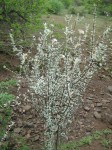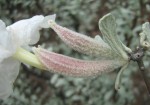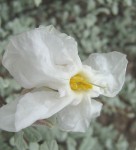| Home | > | List of families | > | Bignoniaceae | > | Catophractes | > | alexandri |
Catophractes alexandri
Selected images: Click on each image to see a larger version and details of the record View all images (12)
Detailed records: Display species records QDS maps by: Google Maps Point records by Google Maps
Species details: Click on each item to see an explanation of that item (Note: opens a new window)
| Synonyms: |
Catophractes kolbeana Harv. Catophractes welwitschii Seem. |
| Common names: | Trumpet-thorn (English) |
| Frequency: | |
| Status: | Native |
| Description: |
Spiny shrub or very small tree armed with slender straight spines. Leaves in fascicles, sometimes opposite, densely covered in silvery-grey hairs, oblong; margins coarsely dentate or crenate. Flowers axillary, solitary, large and showy, white, sometimes tinged with pink with a long yellowish corolla tube. Fruit a thickly woody capsule, warty, greyish-brown when ripe, splitting to release winged seeds. |
| Type location: |
|
| Notes: | |
| Derivation of specific name: | |
| Habitat: | In arid scrub, often forming large stands on limestone. |
| Altitude range: (metres) | |
| Flowering time: | Sep - Nov |
| Worldwide distribution: | Angola, Botswana, Namibia, Zimbabwe and South Africa |
| National distribution: | N,SW,SE |
| Growth form(s): | |
| Endemic status: | |
| Red data list status: | |
| Insects associated with this species: | |
| Spot characters: | Display spot characters for this species |
| Images last updated: | Wednesday 19 October 2016 |
| Literature: |
Coates Palgrave, K. (revised and updated by Meg Coates Palgrave) (2002). Trees of Southern Africa 3rd edition. Struik, South Africa Pages 1009 - 1110. (Includes a picture). Diniz, M.A. (1988). Bignoniaceae Flora Zambesiaca 8(3) Pages 70 - 72. (Includes a picture). Drummond, R.B. (1975). A list of trees, shrubs and woody climbers indigenous or naturalised in Rhodesia. Kirkia 10(1) Page 273. Mapaura, A. & Timberlake, J. (eds) (2004). A checklist of Zimbabwean vascular plants Southern African Botanical Diversity Network Report No. 33 Sabonet, Pretoria and Harare Page 29. Roodt, V. (1998). Trees and Shrubs of the Okavango Delta Shell Field Guide Series: Part I Shell Oil Botswana, Gaberone. Pages 86 - 87. (Includes a picture). Setshogo, M.P. (2005). Preliminary checklist of the plants of Botswana. Sabonet Report no. 37. Sabonet, Pretoria and Gaborone Page 40. Setshogo, M.P. & Venter, F. (2003). Trees of Botswana: names and distribution SABONET Report No. 18 Southern African Botanical Diversity Network, Pretoria Page 33. Van Wyk, B. & Van Wyk, P. (1997). Field Guide to Trees of Southern Africa. Struik, South Africa Pages 120 - 121. (Includes a picture). Van Wyk, B. & Van Wyk, P. (2013). Field Guide to Trees of Southern Africa (Second edition) Struik, South Africa Pages 134 - 135. (Includes a picture). |
Other sources of information about Catophractes alexandri:
Our websites:
Flora of Zimbabwe: Catophractes alexandriExternal websites:
African Plants: A Photo Guide (Senckenberg): Catophractes alexandriAfrican Plant Database: Catophractes alexandri
BHL (Biodiversity Heritage Library): Catophractes alexandri
EOL (Encyclopedia of Life): Catophractes alexandri
GBIF (Global Biodiversity Information Facility): Catophractes alexandri
Google: Web - Images - Scholar
iNaturalist: Catophractes alexandri
IPNI (International Plant Names Index): Catophractes alexandri
JSTOR Plant Science: Catophractes alexandri
Mansfeld World Database of Agricultural and Horticultural Crops: Catophractes alexandri
Plants of the World Online: Catophractes alexandri
Tropicos: Catophractes alexandri
Wikipedia: Catophractes alexandri
| Home | > | List of families | > | Bignoniaceae | > | Catophractes | > | alexandri |




